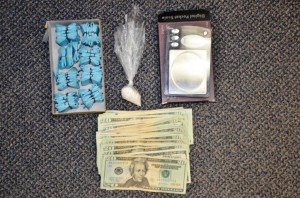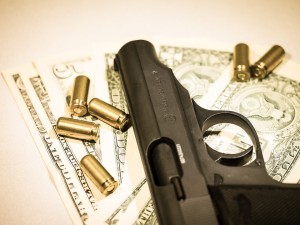 This past week two Maryland men were arrested in Indiana for dealing in marijuana after his van was pulled over on Interstate 70 for following another vehicle too closely. Local sheriff’s deputies allegedly observed several criminal indicators after pulling the vehicle over, which included the odor of raw marijuana and the presence of plant like material on the pants of the driver. A search of the van took place shortly after the traffic stop, and police discovered 16 cardboard boxes that contained numerous vacuum sealed plastic bags of pot. Back at the police station deputies weighed the bags and eventually tallied 400 pounds of cannabis. This large roadside bust resulted in charges for the driver and passenger, who were booked into the county jail and later bonded out. Both defendants now face potential jail time for charges when they return to court.
This past week two Maryland men were arrested in Indiana for dealing in marijuana after his van was pulled over on Interstate 70 for following another vehicle too closely. Local sheriff’s deputies allegedly observed several criminal indicators after pulling the vehicle over, which included the odor of raw marijuana and the presence of plant like material on the pants of the driver. A search of the van took place shortly after the traffic stop, and police discovered 16 cardboard boxes that contained numerous vacuum sealed plastic bags of pot. Back at the police station deputies weighed the bags and eventually tallied 400 pounds of cannabis. This large roadside bust resulted in charges for the driver and passenger, who were booked into the county jail and later bonded out. Both defendants now face potential jail time for charges when they return to court.
The Blog does not typically post about cases that involve drug busts in other states, but since the defendants hail from Maryland we thought it would be an appropriate way to write marijuana related automobile searches, which have been receiving a great deal of attention as of late. Despite nationwide efforts to legalize marijuana it is still an illegal substance in the majority of states, and remains a controlled substance under federal law. Therefore, police officers are still actively searching for suspected marijuana traffickers, and will be especially attracted to vehicles with out of state license plates traveling on interstates around the country. An out-of-state cargo van traveling with two adult male occupants couldn’t be more suspicious to highway patrol officers, so it’s no surprise this vehicle was pulled over. While it almost certainly will not appear in any official report, this particular vehicle likely caught the eye of the deputy sheriff long before it was involved in the alleged traffic infraction. Law enforcement officers are legally able to make pretextual traffic stops, which means they can pull a vehicle over for a minor traffic stop with the full intention of conducting a criminal investigation. It is for this reason that a large percentage of drug busts occur on interstate highways and other major thoroughfares.
In addition to pretextual stops, law enforcement officers in most states are able to search a vehicle upon observing signs indicating the presence of marijuana. This is especially true in Maryland, where the highest court has unequivocally held that the odor of marijuana justifies the search of a vehicle. Almost all law enforcement officers, and especially those from the Maryland State Police and the Maryland Transportation Authority police have special training in drug interdiction, which is the process of preventing drugs from reaching their intended destination. Much of this training includes identifying vehicles that could be transporting marijuana, heroin and other illegal controlled substances. On top of the list are vehicles traveling with out-of-state license plates or vehicles that are registered to rental companies. Police officers on Interstate 95 and Interstate 70 are rarely just looking to nail speeders, but rather are searching for their next drug bust. In this case, the Maryland men seemed destined for law enforcement attention and now they have criminal cases pending in a state with surprisingly lenient marijuana distribution laws. Unlike in Maryland, the equivalent to possession with intent to distribute cannabis is actually a misdemeanor in Indiana for all first time offenders. One of the men recently was charged with a drug offense in Baltimore County, but his case did not result in a conviction. it is unclear whether either defendant has priors in others states. The Blog will follow this case and others like it, and may post a follow up article in the near future.
 Criminal Defense Lawyer Blog
Criminal Defense Lawyer Blog









